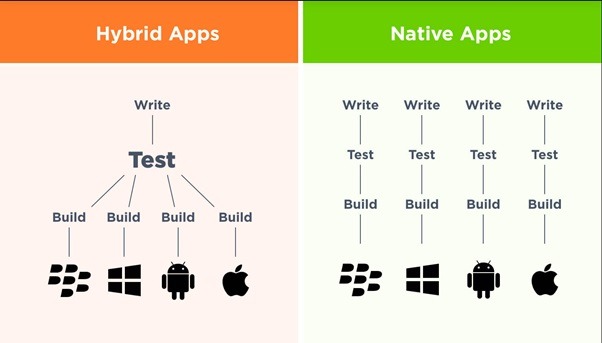- Like
- SHARE
- Digg
- Del
- Tumblr
- VKontakte
- Flattr
- Buffer
- Love This
- Save
- Odnoklassniki
- Meneame
- Blogger
- Amazon
- Yahoo Mail
- Gmail
- AOL
- Newsvine
- HackerNews
- Evernote
- MySpace
- Mail.ru
- Viadeo
- Line
- Comments
- Yummly
- SMS
- Viber
- Telegram
- JOIN
- Skype
- Facebook Messenger
- Kakao
- LiveJournal
- Yammer
- Edgar
- Fintel
- Mix
- Instapaper
- Copy Link
Hybrid Applications are a part of an upward trend in today’s time due to a fast evolution in their technologies. They are increasingly becoming popular among 3.5 billion mobile users across the world. Hybrid Applications offer a convinient choice to companies as well as developers due to their ability to be scaled to different operating systems and platforms and the less use of valuable resources such as lower price and timeframe for development.
Atimi Hybrid App Development Company, as the pioneers of the technology, has curated the following guide that will give you a perfect overview of what hybrid applications has to offer and what key benefits do they offer along with some great examples of hybrid apps.
Hybrid App Development
Hybrid Apps are a blend of native and web solutions that are also known as cross-platform mobile apps. It features a process of building a single app that has the ability to run on various operating systems such as Android. iOS and Windows.
While developing a hybrid app, the developers only have to include a single code bar that works for all the platforms. This means, after writing the code only once, they are able to run it everywhere.
The involvement of some tools also facilitates making communication easier between web view and native platform. With their help, hybrid mobile applications could be transformed into native apps.
Key Benefits of Hybrid App Development

Below we have mentioned the five major benefits of hybrid app development:
1. Lower Cost of Development
Hybrid mobile apps are budget-friendly and cost way less than native mobile apps. It allows the developers to write only one code and use it everywhere that saves a lot of resources. Along with the initial cost, the maintenance cost of a hybrid app is also very less.
2. Faster Build Time
They can easily be built in less time since developers only have one database to manage.
3. Can Easily Be Scaled on Another Platform
As the hybrid apps use a single codebase, they can easily be scaled on other platforms. Such hybrid apps built for android can be launched to iOS as well.
4. Offline Availability
The native infrastructure of the hybrid apps allows them to be used in offline mode as well. However, users may not be allowed to access real-time data but they can easily access the previously loaded information.
5. Only One Code to Manage
This is the top reason that leads to other benefits of hybrid app development. Unlike other development approaches, you only have to manage one database in hybrid software building.
Best Examples of Hybrid Applications
Following are the great examples of hybrid applications that are extremely popular among users in the world:
1. Instagram
Instagram is the most popular social media application out there and it is also among the most used applications in the world. The hybrid development approach allows Instagram to support tons of media and allows the users to access the data on the application in the offline mode as well.
2. Uber
Uber is the most used ride-sharing application in the world. Its application also features an intuitive user interface with easy navigation. It is very convinient and easily accessible for the users.
3. Gmail

Gmail was previously built using HTML but since then Google has upgraded its approach to HTML 5 that allows users to access new and advanced features and functionalities that enhance the user experience.
It efficiently used the combination of native and web elements to serve its users with a high-performance mobile app.
Most Popular Hybrid App Development Tools
After a popular survey and reviewing the best hybrid app development tools if 2021, Atimi Hybrid Development Company was able to come up with the following list:
1. React Native
React Native tops the list of best hybrid app development tools of 2021. It is based on React and JavaScript and offers native modules. This tool is the preferred choice among developers due to its framework.
The React Native tools enable the developers to convert the source code into native elements which helps it to deliver a native experience to users.
2. Flutter
Flutter is the next popular choice for developers for the development of hybrid applications. It is powered by Google and accommodates various operating systems by supporting multiple programming languages.
It is increasingly becoming popular due to its speed and added features. It also offers real-time updates and a rich collection of widgets.
3. Ionic
Ionic is a free and open-source framework which the most popular tool for the development of hybrid applications used by a large community of developers. It features an extensive set of tools such as testing tools, native UI components, and layouts, debugging which helps developers build a more interactive tool.
Apart from this, this hybrid application is also known for its maintainability and scalability.
4. Xamarin
Xamarin is a hybrid app development tool by Mircosoft that uses the C# programming along with the .NET framework. It offers a similar user experience and performance to native solutions and is compatible with different platforms.
5. PhoneGap
The last one on the list is known for its compatibility and convenience to be used with multiple platforms. it is distributed by the Cordova Framework and allows developers to HTML, CSS, JavaScript, and other popular programming languages to write a single codebase, and then it converts them into an app in just a few minutes. It also features various plugins that allow the application to use the functionality of devices such as compass, camera, microphone, and more.


